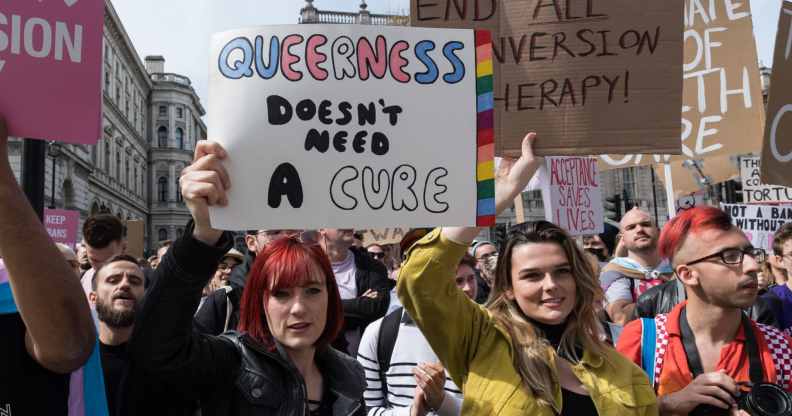Scotland puts Tory government to shame with incredible plan to ban conversion therapy

Conversion therapy has been banned in multiple countries. (Future Publishing via Getty/ Wiktor Szymanowicz)
A comprehensive conversion therapy ban is on the horizon in Scotland, as the government has published an incredible report from its expert advisory group.
Members of the Expert Advisory Group on Ending Conversion Practices, including LGBTQ+ organisations, faith communities, mental health professionals, legal professionals, human rights advocates, academics and people with personal lived experience of conversion practices, spent around six months developing their report.
Its vision for eradicating conversion therapy in Scotland was inspired by anti-conversion therapy legislation in the Australian state of Victoria, the group said, which tackles conversion therapy through the criminal justice system as well as the state’s equality and human rights commission.
The report lays out key principles for legislating against conversion therapy, including that a future ban must cover any treatment, practice or effort that aims to change, suppress or eliminate a person’s sexual orientation, expression of sexual orientation, gender identity or gender expression. It also includes a section focusing on the experiences of LGBTQ+ people of colour and survivors from minority ethnic faith groups.
Richy Edwards, a survivor and member of the expert advisory group, told PinkNews that he underwent religious conversion therapy in Scotland over a period of 17 years, starting at the age of 11.
“In hindsight, looking back now as an adult who knows better, I almost feel like they could tell that I was a gay child, and they meant to stamp it out and to prevent it from going anywhere,” he said.
His experience involved a range of tactics, from “praying the gay away” to exorcisms: “They were trying to cast demons out of me, the demon of homosexuality… Before you know it, you really do start to live small, and shame… I don’t think I can ever overestimate the power of shame, still now. I was in a relationship for six years, and my family didn’t know about it because I still just didn’t know how to tackle it.”
The expert group recommends that the Scottish government gives no exemptions for religious practice or adult consent, relying on thorough definitions to be clear on what is and is not conversion therapy.
“We really wanted to make sure there was no option for loopholes,” said Edwards. “We felt that if we got the definition right, there would be no need for exemptions, because having an exemption just opens you up to loopholes.”
The approach is in stark contrast to the Conservative Party’s UK conversion therapy consultation document produced a year ago, which was littered with red flags, comparing medical treatment for trans kids is compared to conversion therapy, providing religious exemptions, and even stating that adults could freely consent to conversion therapy. The proposals for UK legislation deteriorated further when this year it was announced that a ban would only cover sexual orientation, and not gender identity.
Edwards said: “I really hope that when it comes to writing the [Scottish] bill and it comes to parliament next year, that the leg work that we’ve done on it can really push them down south to be able to say: ‘If they can do this in one part of the UK, why can’t it be done anywhere else?'”
https://twitter.com/iamrichyedwards/status/1577254022838648832
The expert group’s report puts conversion therapy survivors front and centre, detailing the need for those who have been subjected to harmful practice to have full autonomy, and to have access to extensive support measures.
Edwards said that he was pleasantly surprised that survivors were such a large and valued part of the group, “because it’s just too easy not to do this sort of thing”.
He continued: “I don’t doubt for one minute that it was challenging for people in the group to hear our experiences, but we are experts because of the fact that we went through it. Our voices have to be part of it, and if survivors aren’t at the heart of it, then it’s not worth the paper that it’s written on.”
In response, Scotland’s minister for equalities Christina McKelvie said the government “welcomed” the report, adding: “I would like to extend my thanks and gratitude to each member of the group for their time, expertise and dedication in producing this report. I especially want to thank those members with lived experiences of conversion practices; the bravery you showed by continually stepping forward to tell your story in the fight for change is admirable and inspiring.
“Your contributions and insights will help ensure that these abhorrent practices never again happen in Scotland and are consigned to history.”
The comprehensive report, she said “will help to inform the measures we adopt as we progress with the legislative process and other action to end conversion practices and ensure adequate measures are established to support victims and survivors”.
“I want a Scotland in which everyone, regardless of their sexual orientation or gender identity, is safe from these harmful and discriminatory practices,” McElvie added.

